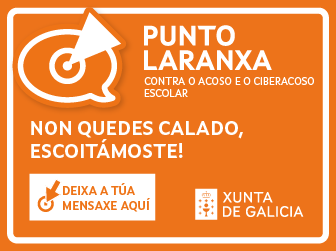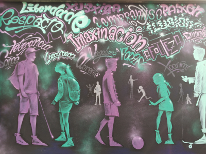El proyecto "Ampliando fronteiras" "Wibo" es el segundo proyecto dentro de Erasmus+ del IES de Foz. El equipo de trabajo está formado por cinco personas si bien otras muchas han colaborado de forma desinteresada, impartiendo cursos de idiomas, ayudando en la gestión del día... implicándose la mayor parte del claustro de profesores.
Hemos desarrollado un total de 12 movilidades, seis de alumnos, cinco de profesores y una de personal docente de una empresa externa(cocinera). Tres alumnos (2 de cocina y 1 de servicios) han realizado una movilidad de 28 días en Potenza, Italia, durante el mes de febrero, trabajando en restaurantes de la ciudad. Dos alumnos de servicios, han realizado 28 días de su "Formación en Centros de Trabajo" en Rennes, Francia, en un restaurante con estrella Michelin, muy valorado en la región. Una alumna de cocina ha realizado 28 días de prácticas en un restaurante de Castelmezzano, durante el mes de mayo. Cuatro profesores se han desplazado a la región de Basilicata en noviembre de 2018 para realizar una actividad de "Job Shadowing" de cinco días tanto en institutos homólogos como en empresas, y una profesora ha disfrutado durante cinco días de esta misma actividad de "Job Shadowing", en París, en dos centros de hostelería, homólogos al nuestro. Maria Antonietta Santoro, reputada cocinera italiana vino durante cinco días a nuestro instituto para impartir formación a alumnos, a profesores y a empresarios de la comarca.
Fruto de la actividad de "Job Shadowing" en Francia, el "Lycée Jean Drouant" de París ha venido a participar en nuestro "Campeonato Internacional de Baristas", con enorme repercusión en toda la comunidad barista de España. Fruto también de este programa, Franco López, "pizzaoili" de Potenza, estudia abrir una pizzeria en nuestra comarca. Por este motivo pasó unos días en nuestro centro, dando a conocer su producto, valorando su introducción en la gente más joven y viendo locales de alquiler...Esta amistad surgió en noviembre de 2017, gracias a la visita de nuestros profesores a su local en Potenza.
Gracias a nuestra amplia difusión y repercusión en la comarca, un colegio cercano, el CEIP de Cervo, que participa por primera vez en un proyecto Erasmus, se puso en contacto con nosotros para aprovechar nuestra experiencia y ayudarles con tres actividades, una celebrada el 9 de mayo, Día de Europa, donde nuestros alumnos cocinaron postres típicos de otros países europeos para celebrar este día y otra poniendo en contacto a "Franco López", pizzaoili, y a su coordinadora Erasmus, Esther Basanta. Franco impartió un curso de elaboración de pizzas a los alumnos de primaria. El 1 de junio, dos de nuestros profesores de idiomas, colaboraron con ellos impartiendo formación en lenguas extranjeras, para que los alumnos del colegio conocieran de primera mano otras lenguas.
El principal objetivo del proyecto es el de internacionalizar la institución y contribuir a las posibilidades de empleo de nuestros alumnos. Ambos objetivos han sido superados con creces, y en el nuevo proyecto, ya en marcha, seguimos trabajando con ellos e incluso ampliando contactos, países y movilidades.
Todas las actividades realizadas están encaminadas a a un mejor conocimiento de los sistemas de FP así como su repercusión y vinculación con el mundo empresarial para mejorar la formación docente, de cara a que esta formación repercuta en los alumnos, el centro y en consecuencia en la empleabilidad.
Todos los participantes han recibido formación previa tanto de lengua italiana, como francesa, para mejorar su capacidad lingüística en el país, curso de formación sobre Italia y Francia, costumbres, cómo aprovechar el proyecto, tareas a realizar en la estancia, consignas de seguridad...
Los resultados han superado nuestras expectativas, han sido muy satisfactorios. Hemos conseguido internacionalizar nuestro instituto, creando una red de centros y empresas a nivel europeo que colaboran con nosotros. Esto se ha visto reflejado en el nuevo proyecto Erasmus+ solicitado para el próximo curso donde ampliamos países, empresas colaboradoras y centros homólogos.
Se ha informado a otros centros de hostelería de nuestro proyecto, se ha colgado toda la información en la página web: "http://www.edu.xunta.gal/centros/iesfoz/taxonomy/term/84" y nos hemos reunido con empresarios de hostelería de la comarca para presentar el programa y aportar acciones donde podemos colaborar entre la región de Basilicata y A Mariña.
El profesorado ha respondido a los retos planteados, ha regresado muy motivado con el proyecto Erasmus, con ganas de ampliar el proyecto y trabajar en el, lo más positivo ha sido la introducción de acciones de mejora en su actividad formativa, que se han visto reflejadas en sus clases, con impartición de clases de cocina de otros países.
La coordinadora del proyecto ha realizado seis cursos relacionados con Erasmus y Etwinning para mejorar sus competencias en proyectos europeos y ampliar sus contactos además de compartir información.
En noviembre hemos celebrado la "Semana Europea de la FP", con un impacto muy positivo en la comarca, atrayendo a mucha gente a nuestro centro para ver la exposición sobre Basilicata y París y degustar el menú especial italiano y francés.
El impacto de las movilidades de alumnado ha sido el más positivo, han regresado con un nivel de idioma increíble después de 28 días, con una gran especialización en cocina italiana y lo más importante, con ganas de seguir viajando.
Como consecuencia de todos estos datos aportados, estamos muy contentos con la realización de este proyecto, siendo muy positivo para todos los entes participantes.





